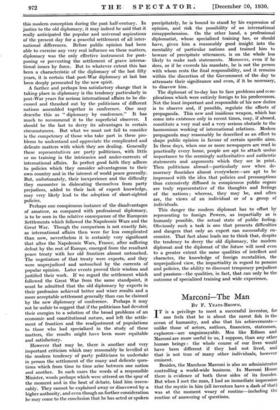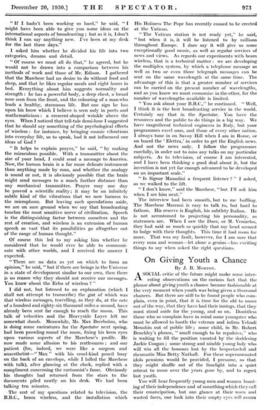Marconi—The Man
BY F. YEATS-BROWN.
IT is a privilege to meet a successful inventor, for one feels that he is about the rarest fish in the ocean of humanity, and also that his achievements— unlike those of actors, authors, financiers, statesmen, explorers—are ungainsayable. Men like Edison and Marconi are more useful to us, I suppose, than any other human beings : the whole course of our lives would have been different if they had not lived, and that is not true of many other individuals, however eminent.
Besides, the Marchese Marconi is also an administrator controlling a world-wide business. In Marconi House there is evidence of both these sides of its founder. But when I met the man, I had an immediate impression that the mystic in him (all inventors have a dash of that) was at the moment weary of routine—including the routine of answering of questions. " If I. hadn't been working so hard," he said, " I might have been able to give you some ideas on the international aspects of broadcasting ; but as it is, I don't think I can say anything new. I've been at my desk for the last three days."
I asked him whether he divided his life into two categories, dreams and detail.
" Of course we must all do that," he agreed, but he Would not be drawn into a comparison between his Methods of 'work and those of Mr. Edison. I gathered that. the Marchese had no desire to do without food and sleep, and that he likes regular meals and eight hours in bed. Everything about him suggests normality and strength : he has a powerful body, a deep chest, a broad nose seen from the front, and the colouring of a man who leads a healthy, strenuous life. But one sign he has upon his brow which I believe is seen only in poets and mathematicians : a crescent-shaped wrinkle above the eyes. When I noticed that tell-tale demi-lune I suggested that he should say something of the psychological effects of wireless : for instance, by bringing cosmic vibrations into everyday life, so to speak, had it not influenced our ideas of God ?
" It helps to explain prayer," he said, " by making the miraculous possible. With a transmitter about the size of your head, I could send a message to America. Now, the human brain is a far more delicate instrument than 'anything made by man, and whether the analogy is sound or not, it is obviously possible that the brain 'might send messages to a much further distance than any mechanical transmitter. Prayer may one day be proved a scientific reality; it may be an infinitely subtle kind of the vibrations that we now harness to the microphone. But leaving such speculations aside, we are on sure ground when we say that broadcasting touches the most sensitive nerve of civilization. Speech is the distinguishing factor between ourselves and the rest of creation, and wireless is an extension of human speech so vast that its possibilities go altogether out of the range of human thought."
Of . course this led to my asking him whether he considered that he would ever be able to communi- cate with other worlds, and I received the answer I expected.
" There are no data as yet on which to form an opinion," he said, " but if there are beings in the Universe in a state of development similar to our own, then there is no reason why they should not receive our messages. You know about the Echo of wireless ? "
I did not, but listened to an explanation (which I shall not attempt to transcribe) the gist -of which was that wireless messages, travelling, as they do, at the rate of a hundred and eighty-six thousand miles a second, have already been sent far enough to reach the moon. This talk of velocities and . the Heavyside Layer left me somewhat dumb. Meanwhile, Mr. Max Beerbohm, who is doing some caricatures for the Spectator next spring, had been prowling round the room,- fixing Isis keen eyes upon various aspects of the Marchese's profile. He now made some allusion to his restlessness ; and our patient (for, indeed, we were like a surgeon and anaesthetist—" Max " with his cruel-kind pencil busy on the back of an envelope, while I lulled the Marchese .with talk), after glancing at the clock, replied with a compliment concerning the cartoonist's fame. Obviously his thoughts had returned from the stars to the documents piled neatly on his desk. We bad been talking ten minutes.
'The test of my questions .related to television, the B.B.C., beam wireless, and the installation which
His Holiness-The Pope has recently caused to be erected at the Vatican.
" The Vatican station is not ready yet," he said, " but when it is, it will be listened to by millions throughout Europe. I dare say it will give us some exceptionally good music, as well as regular services of news and views. As regards our experiments with beam wireless, that is a technical matter : we are developing the multiplex system, by which a telephone message as well as two or even three telegraph messages can be sent on the same wavelength at the same time. The advantage of this is that a greater number of services can be carried on the present number of wavelengths, and as you know we must economise in the ether, for the number of wavelengths available is limited.
" You ask about your B.B.C.," he continued. " Well, I think it is the best broadcasting service in the world. Certainly say that in the Spectator. You have the resources and the public to do things in a big way. We have magnificent technical engineers in Italy, but your programmes excel ours, and those of every other nation. I always tune in on Savoy Hill when I am in Rome, or on board the Elettra,' in order to get the English news. And not the news only. I follow the programmes carefully, in order not to miss any talks on my particular subjects. -As to television, of course I am interested, and I have been thinking a good deal about it, but the invention is not yet far enough advanced to be developed on an important scale."
" Is Signor Mussolini a frequent listener ? " I asked, as we walked to the lift.
" I don't know," said the Marchese, "but I'll ask him when I see him next."
The interview had been smooth, but to me baffling. The Marchese Marconi is easy to talk to, but hard to fathom. His reserve is English, his subtlety Italian. He is not accustomed to projecting his personality, as statesmen are. When I saw the Duce, or M. Venizelos, they had said so much so quickly that my head seemed to bulge with their thoughts. This time it had room for more. That was my fault, however, for I am sure that every man and woman—let alone a genius—has exciting things to say when asked the right questions.







































 Previous page
Previous page